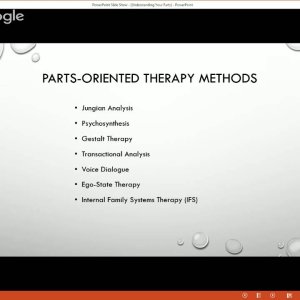“Imbalanced systems, whether internal or external, will tend to polarize.”
"Clients come to psychotherapy intent on changing, rather than accepting, their unwanted behaviors, emotions, or thoughts. The problem often is, however, that their lack of self-acceptance is the pri- mary obstacle to change. This article describes how one approach, the Internal Family Systems (IFS) model, fosters clients’ acceptance of all parts of themselves no matter how destructive, and how that acceptance can lead to the transformation of those parts and, in turn, of other people."
― Richard C. Schwartz
“While European philosophy tended to find reality in substance, Chinese philosophy tended to find it in relation.”
― Joseph Needham (1962)
Depression, a pervasive mental health condition, requires a multifaceted approach for healing. While professional assistance is crucial, incorporating self-help strategies can enhance recovery. Internal Family Systems (IFS) therapy, a powerful therapeutic approach, offers individuals a framework to navigate their inner world and facilitate healing from depression. In this article, we will delve into the application of IFS for self-help, offering a deeper understanding of how it can foster self-compassion, empower individuals to unburden emotional wounds, and cultivate resilience on the path to emotional well-being.
Understanding Internal Family Systems (IFS) Therapy
Dr. Richard Schwartz developed Internal Family Systems therapy, which acknowledges the mind as being composed of multiple subpersonalities or "parts." By learning to understand and balance these different parts, IFS therapy empowers individuals to better navigate distractions, reduce rumination, and achieve a state of heightened attention and concentration. For instance, when suffering from depression, certain internal parts may suppress hope to avoid further emotional pain or disappointment.
These parts represent different facets of our internal world and fall into two main categories: "exiles" and "managers/firefighters." Exiles are wounded parts that hold onto unresolved emotional pain and traumatic experiences, often causing feelings of sadness, shame, or vulnerability. On the other hand, managers and firefighters act as protective mechanisms, attempting to shield us from discomfort. Although their intentions are positive, they may sometimes contribute to patterns of depression, anxiety, or self-destructive behavior.
Applying IFS for Self-Help in Depression
1. Cultivating Self-Compassion:
Self-compassion forms the foundation of IFS therapy. In the context of self-help for depression, individuals can begin by acknowledging their exiled parts—the wounded aspects of themselves—without judgment or suppression. By cultivating self-compassion, individuals create a safe and accepting internal environment, allowing for healing and transformation. Engaging in self-reflective practices, such as writing compassionate letters to oneself or practicing loving-kindness meditation, can foster self-compassion.
2. Discovering and Unburdening "Exiles":
Self-help in depression involves identifying the specific parts that contribute to depressive symptoms. These parts may include deep-rooted sadness, feelings of shame, self-criticism, or a sense of worthlessness. Through introspection, journaling, or creative expressions, individuals can bring these exiles into awareness. Once identified, individuals can develop a compassionate dialogue with these parts, seeking to understand their needs and working towards their healing and integration. Journaling prompts, artistic expression, and guided meditations can facilitate this exploration.
3. Building a Healthy Relationship with "Managers" and "Firefighters":
Managers and firefighters serve as protective parts that aim to shield us from emotional pain. However, their strategies, such as avoidance, overworking, or substance use, can exacerbate depression symptoms in the long run. By developing a compassionate relationship with these parts, individuals can understand their intentions and explore healthier coping strategies. Engaging in self-reflection and journaling can be helpful in identifying the triggers and patterns associated with these protective parts. Exploring alternative coping mechanisms, such as engaging in hobbies, connecting with supportive individuals, or practicing stress-reducing activities, can gradually shift the role of these parts.
4. Enhancing Self-Leadership:
IFS emphasizes the concept of the Self—the core, compassionate, and wise aspect within each individual. Cultivating the Self involves accessing qualities such as curiosity, empathy, and acceptance. Through practices like meditation, mindfulness, visualization, or connecting with nature, individuals can strengthen their connection to their Self. This connection cultivates a sense of inner stability, resilience, and clarity. The Self can then guide and lead the healing process, making empowered choices that support emotional well-being. Engaging in self-reflection exercises, mindfulness practices, and self-care routines can enhance self-leadership.
5. Seeking Professional Support:
While self-help strategies based on IFS can be transformative, it's important to recognize the value of professional support in managing depression. Seeking guidance from a qualified therapist trained in IFS can provide a safe space to explore deeper layers of emotional healing, gain insights into complex parts dynamics, and receive personalized guidance tailored to specific needs. Therapists can facilitate the process of unburdening exiles, navigate complex emotions, and provide additional therapeutic interventions that complement self-help efforts. IFS can be used alongside cognitive-behavioral therapy (CBT), psychodynamic therapy, mindfulness-based approaches, and more, depending on the needs and preferences of the individual.
Conclusion
Embracing Internal Family Systems (IFS) principles in self-help strategies for managing depression offers a powerful framework for healing and well-being. By cultivating self-compassion, unburdening exiles, building a healthy relationship with protective parts, enhancing self-leadership, and seeking professional support when needed, individuals can embark on a transformative journey of self-discovery and resilience. Remember, each person's experience with depression is unique, so approach self-help with patience, kindness, and a willingness to explore the inner landscape with compassion and curiosity.
Related resources:

Dear Firefighter: What the IFS Model Can Offer to Those with Suicidal Thoughts — IFS Telehealth Collective
In IFS, all parts are truly welcome and they are so much more than their burdens and beliefs. It is also true that not all firefighters are extreme or dangerous. When unburdened, they might offer valuable qualities such as courage, adventurousness, confidence, passion, and playfulness to the intern

No Bad Parts
Discover an empowering new way of understanding your multifaceted mind—and healing the many parts that make you who you are. Is there just one “you”? We’ve been taught to believe we have a single identity, and to feel fear or shame when we can’t...
forum.psychlinks.ca
